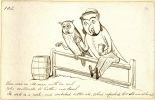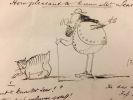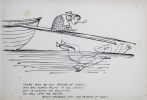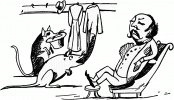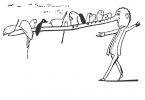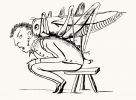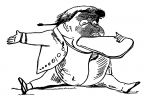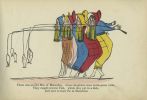In the catalogue were published several drawings by Edward Lear as a symblolic counterpoint to the scientific illustrations from Athanasius Kircher’s books.
The British poet and painter known for his absurd wit, Edward Lear was born on May 12, 1812 and began his career as an artist at age 15. His father, a stockbroker of Danish origins, was sent to debtor’s prison when Lear was thirteen and the young Lear was forced to earn a living. Lear quickly gained recognition for his work and in 1832 was hired by the London Zoological Society to execute illustrations of birds. In the same year, the Earl of Derby invited Lear to reside at his estate; Lear ended up staying on until 1836. His first book of poems, A Book of Nonsense (1846) was composed for the grandchildren of the Derby household. Around 1836 Lear decided to devote himself exclusively to landscape painting (although he continued to compose light verse). Between 1837 and 1847 Lear traveled extensively throughout Europe and Asia. After his return to England, Lear’s travel journals were published in several volumes as The Illustrated Travels of a Landscape Painter. Popular and respected in his day, Lear’s travel books have largely been ignored in the twentieth century. Rather, Lear is remembered for his humorous poems, such as “The Owl and the Pussycat," and as the creator of the form and meter of the modern limerick. Like his younger peer Lewis Carroll, Lear wrote many deeply fantastical poems about imaginary creatures, such as “The Dong with the Luminous Nose.” His books of humorous verse also include Nonsense Songs (1871) and Laughable Lyrics (1877). Lear died on January 29, 1888 at the age of 76. Although the subject and form of his works varies greatly, all of Lear’s poems can be characterized by his irreverent view of the world; Lear poked fun at everything, including himself in “By Way of a Preface.” Many critics view Lear’s devotion to the ridiculous as a method for dealing with or undermining the all-pervasive orderliness and industriousness of Victorian society. Regardless of impetus, the humor of Lear’s poems has proved irrefutably timeless.
https://www.poets.org/



